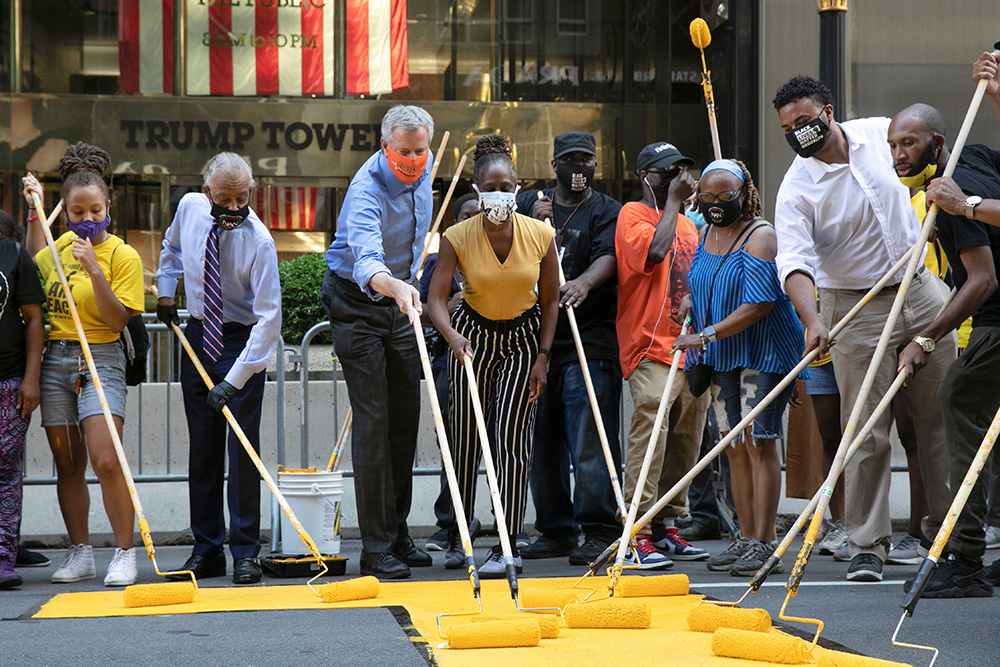George Floyd Protesters: Why Most Won’t Face $1000 In Fines & Jail If Arrested — Criminal Lawyers
While hundreds of thousands of protesters take to the streets, it’s important that they know their rights should they clash with police. Two top criminal attorneys give their advice to protesters who could get arrested.
As protests continue in all 50 states in the wake of George Floyd‘s unjust death, two expert lawyers — LA criminal attorney Sharen H. Ghatan, and New York criminal attorney Julie Rendelman — are sharing with HollywoodLife EXCLUSIVELY how the demonstrators can protect themselves, and what they need to do if they get in trouble with the law. Ghatan and Rendelman explain that while some protesters could face a $1000 fine and months of jail time if arrested, it’s not always the case. They answered some of our biggest questions about safely protesting, including what to do if you think law enforcement has mistreated you while in custody.
If You’re Arrested For Peacefully Protesting, Even After Curfew
Ghatan recommends that anyone arrested for breaking curfew while protesting plead “not guilty,” as that’s what she will be doing for their peaceful protester clients. “We can definitely fight these lower level, benign charges, and we feel confident that we can ultimately get them dropped,” she explained. For those arrested for unlawful assembly, no matter the time of day, Ghatan says to fight the charges. “It is very likely that these will be rejected by the City Attorney/Prosecutor’s offices or they will be reduced down to an infraction, which would simply involve paying a fine. Infractions are like parking tickets: citations that simply assign a monetary penalty, without the exposure to county jail or state prison.”
Rendelman said that it’s “unlikely” that curfew violators will be arrested unless they’re “engaging in other types of unlawful activity,” but warned that it varies from state to state. Arrestees could be charged with “a misdemeanor with potential jail time, to a simple summons with a fine.” But an Unlawful Assembly arrest is different. “The charge involves individuals that assemble for the purpose of engaging in violent or tumultuous conduct,” she explained. “In New York, Unlawful Assembly is a class B misdemeanor, which subjects an individual to possible jail time, probation, or a fine.”
She elaborated that the maximum punishment is 90 days in jail, one year of probation, and a $500 fine. “Keep in mind that individuals are allowed and have every right to peacefully protest. It’s when the behavior is for the purpose of a violent act that it becomes a potential criminal issue.”
If You’re Arrested For Getting Into A Skirmish With Police
This could go a little differently, Ghatan said, depending on the reason for arrest. If a protester is charged with Resisting Arrest at a rally, a misdemeanor offense, “the maximum penalty is up to one year in county jail and a maximum of $1000 in fines. Or, they could be charged with Disobeying A Peace Officer, also a misdemeanor, and the penalty is up to six months in county jail and a maximum fine of $1000. If things are more serious, and they are charged with Inciting a Riot (another misdemeanor), that’s punishable by fines up to a $1000 plus penalty assessments, and up to a year in county jail.
“If the defendant incited a riot that resulted in serious bodily injury to another, the offense is then a ‘wobbler,’ which can be filed as a felony or a misdemeanor. If filed as a felony, the defendant can be sentenced to an additional term in prison.”
If You’re Arrested & Believe Police Mistreated You
“There are a few important points that we like to discuss with clients who are concerned about excessive force,” Ghatan said. “First, we asked them to inform us of, and take photos of any bruising, cuts, or other injuries caused by the excessive force. Next, we inquire as to how long they were in handcuffs and or flex ties. Were they cuffed in front or back? Then, we asked them to tell us if they were ever hit by a baton, tased or pepper-sprayed.
“We will also ask them if they had access to bathrooms or if they had to wait an excessive time to use the facilities, or if they were humiliated and/or forced to pee themselves,” she continued. “Lastly, based on all of the answers above, we may inquire whether they were fondled or groped in a purposeful and sexual manner. Once we get all those answers, we decide whether we will pursue an inquiry with internal affairs about said arresting officer and his/her arresting agency.”
Will An Arrest Go On Your Permanent Record?
Not necessarily, says Ghatan. It’s possible for a protester to get the infraction expunged from their record if they meet certain criteria. “If one is found guilty of a charge, after he/she completes the entire term of probation, along with successfully completing all agreed upon terms of disposition, AND does not pick up any new cases throughout the term of probation, we can file an expungement immediately at the end of probation,” she explained.
“If the client needs this done earlier, and completes all terms sooner, we can file for an ‘Early Termination of Probation’ and an ‘Expungement.’ We usually advise our clients to contact us at the halfway point of their probation to do the latter. When over 50% of probation is completed properly, without any contacts with the law, the judge is more inclined to grant our request.”
Even if you’re not protesting on the frontlines, there are still plenty of ways you can support the Black Lives Matter movement, and honor the George Floyd, Breonna Taylor, and Ahmaud Arbery. Check out a comprehensive list of resources HERE.
